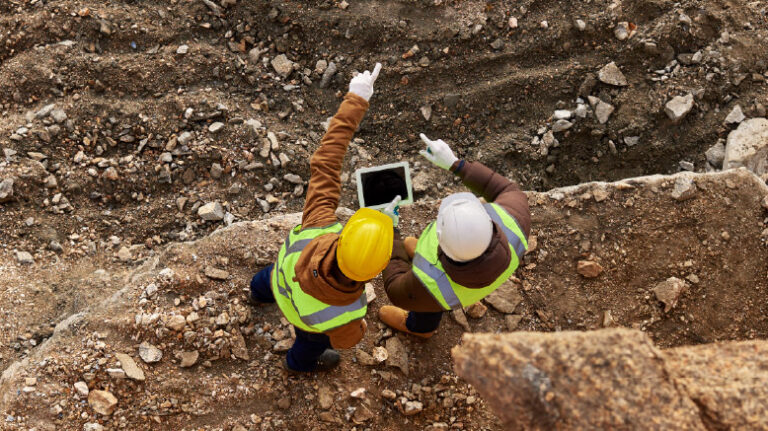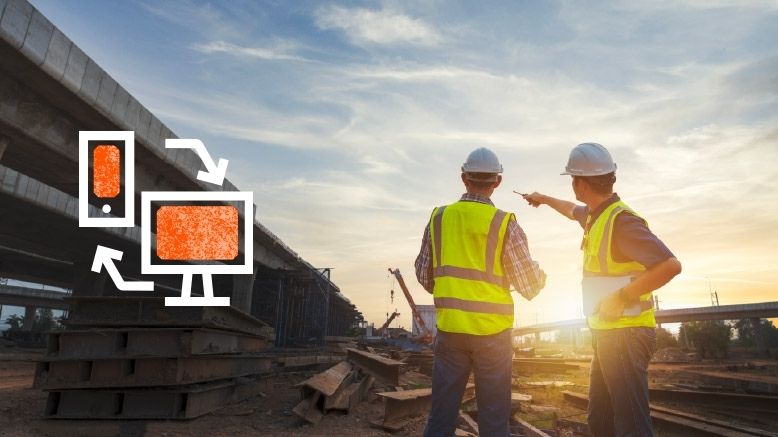— 5 min read
Building a Culture of True Tech Readiness in Civil Construction


Last Updated Sep 23, 2025

Israel Simmons
Civil & Infrastructure Solutions Specialist
11 articles
Israel Simmons, DBIA, CCM, PMP is a seasoned construction leader with over 12 years of experience delivering more than $3 billion in complex civil and infrastructure projects across the United States. His portfolio spans major freeway and bridge programs, rail and transit, wastewater treatment facilities, aviation, and other critical infrastructure. He holds a bachelor’s degree in Construction Management with minors in Business Administration and Communications from Drexel University and brings a practitioner’s perspective shaped by work across both owners and contractors. Israel joined Procore to help transform the construction industry through a unified, integrated platform that streamlines project execution from concept through delivery. He is deeply passionate about the development of the built environment, the physical and digital tools that enable it, and the human dynamics that ultimately make it successful.

Marlissa Collier
34 articles
Marlissa Collier is a journalist whose work focuses on the intersections of business, technology, policy and culture. Her work has been featured in digital and print formats with publications such as the Dallas Weekly, XO Necole, NBCU Comcast, the Dallas Nomad, CNBC, Word in Black and Dallas Free Press. Marlissa holds an undergraduate degree in Construction Engineering from California State University, Long Beach and an MBA from Southern Methodist University’s Cox School of Business.
Last Updated Sep 23, 2025

While significant investments are pouring into revitalizing the nation's infrastructure, the true capacity to capitalize on this opportunity hinges on more than just funding — it relies on a fundamental shift in how the industry considers and approaches technology.
True tech readiness extends far beyond simply acquiring the latest digital tools. It demands a deep strategic alignment, robust internal infrastructure and a profound cultural and mindset shift that permeates every level of an organization, starting from the very top.
Table of contents
Starting From The Top
For quite some time, technology adoption in construction has been viewed as a piecemeal investment—a new drone here, a software subscription there.
However, genuine readiness necessitates a comprehensive understanding from leadership that technology is no longer merely an overhead but the new bedrock of future competitiveness.
True tech readiness starts at the top. It's about executive leadership recognizing that technology is the future of our industry, and then aligning our corporate goals and strategies to fully embrace it. When a CEO or high-level executive actively engages with new technologies, it sets a powerful precedent. It shows the staff that leadership is truly invested in the industry's future, empowering everyone to adopt and explore these vital tools.

Israel Simmons
Civil & Infrastructure Solutions Specialist
Procore Technologies
This top-down commitment is the essential catalyst for empowering staff, fostering a learning environment, and justifying the significant upfront investment required for long-term gains. When a CEO actively champions and engages with new technologies, it sets a powerful precedent, signaling that innovation is a core corporate value, not just a fleeting trend.
It Takes Infrastructure to Build Infrastructure
A key component of readiness to engage in tech adoption is establishing the proper internal infrastructure.
Before any new software or advanced equipment can deliver on its promise, companies must have robust IT systems, reliable networking capabilities and effective field data collection tools. This includes the foundational hardware and connectivity that allows data to flow seamlessly from the job site to the back office. Without this backbone, even the most sophisticated solutions can become isolated islands of data, unable to integrate and provide holistic insights.
In the civil construction industry, this may take the form of a firm investing in reality capture through drone surveys. This firm needs not only the drones but also the bandwidth and processing power to handle large datasets, and a centralized system to store and analyze that information.
Having the latest gadgets isn't enough. Before you can truly leverage new technology, you need robust internal infrastructure — like strong IT systems and networking capabilities — to support those tools. Without that foundation, you're just buying widgets without a way to use them effectively.
Israel Simmons
Civil & Infrastructure Solutions Specialist
Procore Technologies
People First, Tech Second
Equally vital is cultivating a knowledgeable workforce. Technology, like any tool or weapon, is only as good as the person wielding it. This requires not just providing access to tools, but creating clear pathways for education and training.
For example, some leading general contractors, like Bechtel, have established internal "Centers of Excellence" for data and analytics, and even offer internships and fellowships, some of which are focused on AI and robotics. These initiatives demonstrate a commitment to upskilling their workforce and embedding technological expertise directly into their operations. The challenge often lies in bridging the gap for workers who may be less accustomed to extensive digital engagement, requiring intuitive interfaces and hands-on, practical training that resonates with their experience.
We need to build a strong knowledge base within our teams, or at least provide clear pathways for them to gain that knowledge. Even for craft workers less accustomed to reading extensively, it's important to cultivate their understanding and ability to use technology effectively.
Israel Simmons
Civil & Infrastructure Solutions Specialist
Procore Technologies
This shift necessitates a change in mindset, particularly embracing the idea that one must "slow down to speed up." In the schedule-focused world of civil construction, the notion of dedicating more time to pre-construction planning, facilitated by advanced technologies, can feel counterintuitive. However, the meticulous planning enabled by digital tools, such as 3D modeling and sequencing software, allows for an almost granular rehearsal of daily operations before ground is even broken.
This detailed foresight can prevent costly rework and delays later, ultimately accelerating project delivery and improving quality.
Companies successfully navigating this transformation often leverage integrated construction management platforms. These platforms provide a centralized digital environment where all project data resides — from initial designs and estimates to daily progress reports and safety checklists.
These systems enable real-time collaboration between disparate teams, whether they're in the office, at the job site, or collaborating remotely. For example, a project manager can instantly access up-to-date drawings, monitor budget variances and track resource allocation from a tablet in the field, eliminating the delays and errors associated with manual updates or fragmented communication channels. This connectivity fosters transparency and accountability, crucial ingredients for a truly tech-ready culture.
Integrated solutions streamline administrative burdens, allowing highly skilled employees to focus on value-added tasks. Imagine a superintendent no longer spending hours chasing down paper forms or waiting for email updates, but instead instantly receiving critical alerts on their mobile device about material deliveries or equipment status.
This efficiency boosts productivity and contributes to better employee retention. When workers feel more efficient and less bogged down by tedious tasks, their work-life balance improves — which can create a more positive and innovative environment.
Companies that prioritize this culture of digital empowerment find that their employees become more engaged, leading to bolstered domain expertise and a stronger competitive position in the long run.
Free AI in Construction Course with Hugh Seaton
Start learning today with industry expert Hugh Seaton and discover how AI can boost efficiency, reduce risk, and transform your projects.

Building a Foundation of Digital Intelligence
True tech readiness in civil construction is about building a digitally intelligent organization, not just buying digital tools.
It's about a strategic, holistic approach that begins with leadership vision, permeates through robust infrastructure and continuous learning, and culminates in a workforce empowered to innovate and build the resilient infrastructure of tomorrow more efficiently and effectively than ever before.
Creating an engaged and prepared tech culture is changing how civil construction operates, placing technology at its core to bridge the gap between traditional methods and future demands.
Was this article helpful?
Thank you for your submission.
0%
0%
You voted that this article was . Was this a mistake? If so, change your vote
Scroll less, learn more about construction.
Subscribe to The Blueprint, Procore’s construction newsletter, to get content from industry experts delivered straight to your inbox.
By clicking this button, you agree to our Privacy Notice and Terms of Service.
Thank you!
You’re signed up to receive The Blueprint newsletter from Procore. You can unsubscribe at any time.
Categories:
Written by

Israel Simmons
Civil & Infrastructure Solutions Specialist | Procore Technologies
11 articles
Israel Simmons, DBIA, CCM, PMP is a seasoned construction leader with over 12 years of experience delivering more than $3 billion in complex civil and infrastructure projects across the United States. His portfolio spans major freeway and bridge programs, rail and transit, wastewater treatment facilities, aviation, and other critical infrastructure. He holds a bachelor’s degree in Construction Management with minors in Business Administration and Communications from Drexel University and brings a practitioner’s perspective shaped by work across both owners and contractors. Israel joined Procore to help transform the construction industry through a unified, integrated platform that streamlines project execution from concept through delivery. He is deeply passionate about the development of the built environment, the physical and digital tools that enable it, and the human dynamics that ultimately make it successful.
View profile
Marlissa Collier
34 articles
Marlissa Collier is a journalist whose work focuses on the intersections of business, technology, policy and culture. Her work has been featured in digital and print formats with publications such as the Dallas Weekly, XO Necole, NBCU Comcast, the Dallas Nomad, CNBC, Word in Black and Dallas Free Press. Marlissa holds an undergraduate degree in Construction Engineering from California State University, Long Beach and an MBA from Southern Methodist University’s Cox School of Business.
View profileExplore more helpful resources

Why do most construction strategies fail (and how to fix them)?
In this episode of The Power of Construction, hosts Sasha Reed and Brett King sit down with Helen Gawor to challenge construction’s approach to strategy. Helen reveals why most strategies...

Redefining Tech Readiness for Civil Construction’s Future
“Tech readiness” has become a civil construction industry buzzphrase, used to describe the firm of the future. While some believe being “tech ready” simply means acquiring the latest LLMs, drones,...

6 Tips to Turn Construction Culture Into Daily Practice
Every construction company has a culture. Whether it’s intentional or not. The difference lies in how that culture shows up on the job. In the first article of this series on...

Turning Values into Workflows: How a GC Firm Operationalized Culture
Culture isn’t just about what companies believe — it’s about how those beliefs show up in day-to-day work. When culture is embedded into operations, it becomes something teams can rely...
Free Tools
Calculators
Use our calculators to estimate the cost of construction materials for your next project.
Templates
Find a template to help you with your construction project tasks.
Material Price Tracker
Get the latest U.S. retail prices and view historical trends for common building materials.
Glossary
Explore key terms and phrases used in the industry.
